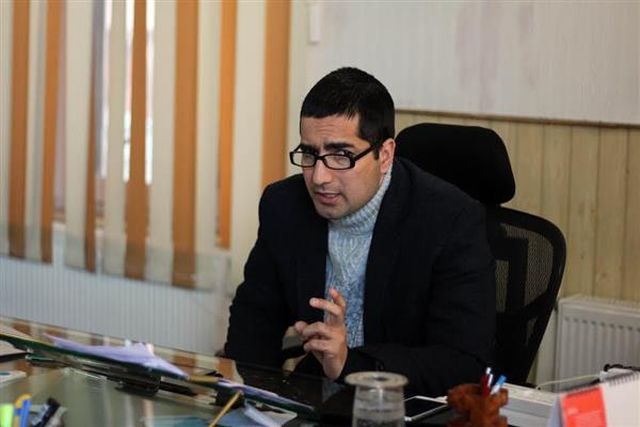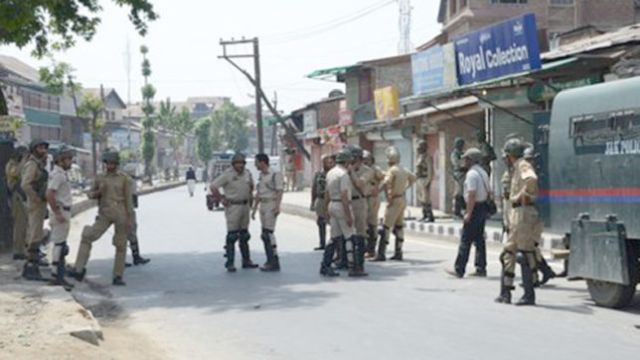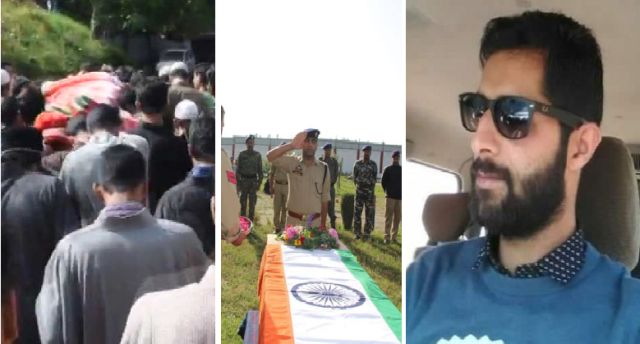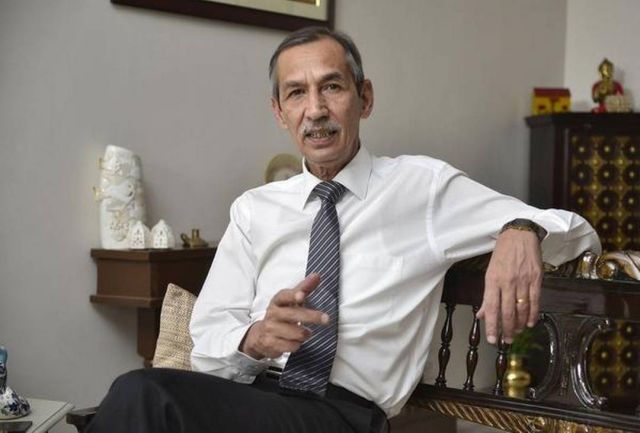
by admin | May 25, 2021 | News, Politics

UN Secretary-General Antonio Guterres
By Arul Louis,
United Nations : UN Secretary-General Antonio Guterres has backed Human Rights High Commissioner Zeid Ra’ad Al Hussein’s call for an international investigation into human rights situation in Kashmir saying that it represents the “voice of the UN”.
He also defended at a news conference on Thursday his own report on children in armed conflict that referred to situations in Jammu and Kashmir, Chhattisgarh and Jharkhand.
He denied India’s assertions that his report overstepped his mandate and that Zeid’s had no mandate and said that they were both covered by the “the general mandate of human rights instruments”.
On Monday, India’s Deputy Permanent Representative Tanmaya Lal told the Security Council that Zeid’s “so-called report” was “reflecting the clear bias of an official who was acting without any mandate whatsoever and relied on unverified sources of information”.
As for Guterres’s report, Lal said: “We are disappointed that the report of the Secretary General includes situations, which do not meet the definition of armed conflict or of threat to maintenance of international peace and security.”
Asked at his news conference if he supported Zeid’s call for the independent international investigation, Guterres said: “As you can imagine all the action of the Human Rights High Commissioner is an action that represents the voice of the UN in relation to that issue.”
Answering a question about the reports running counter to India’s long-standing assertion that Kashmir is a part of India and any problem between the neighbours was a bilateral issue among India and Pakistan, Guterres said there was a distinction between political matters and human rights.
He said: “One thing is the definition of mechanisms for a political solution of a situation in a country and the other thing is the general mandate of human rights instruments in relation to human rights everywhere.”
“What the Human Rights Commissioner did was the use of its own competencies and capacities as it does in all other parts of the world to report on what he considers to be relevant human rights violations,” Guterres explained.
“It does not mean that there is in that a preference for any kind of methodology for a political solution,” he added.
As for India’s saying that the situation in the three Indian states mentioned in Guterres’s report did not meet “a definition of armed conflict or of threat to maintenance of international peace and security,” he said that the same principles applied to it also.
His “report is a report about situations in which the rights of children have been put into question,” Guterres said.
In his report in June on children in armed conflict, Guterres accused Jaish-e-Mohammed and Hizbul Mujahideen in Kashmir and Naxalites in Chhattisgarh and Jharkhand of using children.
The report simultaneously assigned blame to the Indian government saying, “Children continued to be killed and injured in the context of operations of national security forces against armed groups.”
His report added that “unverified reports” indicate national security forces use children as “informants and spies”.
Zeid, whose term gets over at the end of 2018, asked the Human Rights Council to set up a Commission of Inquiry into the human rights situation in Kashmir.
The Council did not take up his suggestion at its session that ended last week.
His report said that “Indian security forces used excessive force that led to unlawful killings and a very high number of injuries” in dealing with protests in the state.
The report raised the issue of the Armed Forces (Special Powers) Act (AFSPA) that he asserted gave security personnel “virtual impunity”.
Zeid also called for the investigation to look into reports of mass graves in the state.
Rejecting Zeid’s report, India’s External Affairs Ministry Spokesperson Raveesh Kumar had said it was “overtly prejudiced and seeks to build a false narrative”.
“We are deeply concerned that individual prejudices are being allowed to undermine the credibility of a UN institution,” he said in a direct personal criticism of Zeid.
He said it was a compilation of “largely unverified information” and “the authors have conveniently ignored the pattern of cross-border terrorism emanating from Pakistan and territories under its illegal control.”
He added, “The entire state of Jammu and Kashmir is an integral part of India. Pakistan is in illegal and forcible occupation of a part of the Indian state through aggression.”
(Arul Louis can be reached at arul.l@ians.in)
—IANS

by admin | May 25, 2021 | News
 Srinagar : The Jammu and Kashmir government on Tuesday initiated disciplinary action against the 2010 Indian Administrative Service (IAS) topper, Shah Faesal.
Srinagar : The Jammu and Kashmir government on Tuesday initiated disciplinary action against the 2010 Indian Administrative Service (IAS) topper, Shah Faesal.
In an official communication to Shah Faesal who is presently in the US pursuing Edward S. Mason Mid-Career post graduate course at the prestigious Harvard University, Jammu and Kashmir General Administration Department said:
“The Centre’s Department of Personnel and Training has requested the state government to initiate an action against you.”
Shah Faesal has been voicing his opinion on the social media platform and he has been of the opinion that the rules prohibiting voicing of opinion on societal and governmental issues on social media by civil servants in India are monarchical and, therefore, need to be revisited immediately.
—IANS

by admin | May 25, 2021 | News, Politics
 Srinagar : Life across the Kashmir Valley was adversely affected on Saturday by a protest shutdown called by the separatists against shifting of Asiya Andrabi, chief of a separatist women group to Delhi.
Srinagar : Life across the Kashmir Valley was adversely affected on Saturday by a protest shutdown called by the separatists against shifting of Asiya Andrabi, chief of a separatist women group to Delhi.
Joint Resistance Leadership (JRL) headed by Syed Ali Shah Geelani, Mirwaiz Umer Farooq and Yasin Malik called the protest after Dukhtaran-e-Milat (Daughters of Faith) chief Andrabi was shifted to Delhi by the National Investigation Agency (NIA) on Friday.
Andrabi and two of her associates, Fahmeeda Sofi and Nahida Nasreen were shifted from the Srinagar Central Jail in connection with a sedition FIR filed against them by the central agency.
The Patiala House Court in Delhi remanded the three to NIA’s custody for 10 days till July 16.
Geelani and Mirwaiz Umer have been placed under house arrest while Malik has been taken into preventive custody.
Shops, public transport and other businesses remained closed in Srinagar city and other district headquarters of the valley.
Rail services have been suspended as a precautionary measure, but Kashmir University officials said all exams scheduled on Saturday would be held as per schedule.
Authorities on Saturday announced curfew in Tral town of Pulwama District on the eve of second death anniversary of Hizbul commander Burhan Wani.
Wani was killed along with two other militants in Kokernag area of Anantnag district on July 8, 2016.
—IANS

by admin | May 25, 2021 | News
 Srinagar : Scores of people on Friday attended the funeral prayers of Jammu and Kashmir constable Javaid Ahmad Dar who was abducted and murdered by militants.
Srinagar : Scores of people on Friday attended the funeral prayers of Jammu and Kashmir constable Javaid Ahmad Dar who was abducted and murdered by militants.
Police said Dar was abducted on Thursday evening by four militants who came in a car and seized him from Vehil village in Shopian district.
His bullet-riddled body was found on Friday morning in the adjacent Kulgam district.
Dar is the second security personnel abducted and murdered by the militants in south Kashmir in recent days.
He was earlier posted as the personal security guard of the Superintendent of Police of Shopian district.
Police said the constable had been part of many anti-militancy operations in south Kashmir in the past but was these days posted in Srinagar district.
On June 14 this year, militants abducted and murdered rifleman Aurangzeb Khan of Rashtriya Rifles when he was going to join his family in Mendhar area of Poonch district to celebrate Eid festival.
Aurangzeb too had taken part in many anti-militancy operations including the one in which a top militant commander, Sameer Tiger, was killed.
Militants also shot and critically injured an Imam, Muhammad Ashraf Thokar, in Parigam village of Pulwama district on Friday.
He was shifted to hospital in a critical condition. The Imam belonged to Bijbehara town of Anantnag district.
No militant group has so far owned the attack on the Imam.
—IANS

by admin | May 25, 2021 | Interviews

Lt. General (retd) Deependra Singh Hooda
By Mohd Asim Khan,
New Delhi : The Indian side was prepared for escalation — in case Pakistan chose to do so — while conceiving and executing the 2016 surgical strikes by crossing the Line of Control (LoC) along the Jammu and Kashmir border, according to the army general who oversaw the strikes.
“We had sort of war-gamed all the contingencies of what could be the impact of the surgical strike. And one of the things that we did consider was that in case Pakistan decides to escalate, then what do we have to do,” Lt. General (retd) Deependra Singh Hooda, who planned and oversaw the execution of the operation as the General Officer Commanding (GoC) of the Northern Command, told IANS in an interview.
“And we had put plans in place of what is to be done in various areas. I can’t go into details, but definitely it was something that we considered,” he added.
On the intervening night of September 28-29, 2016 — 11 days after the Uri attack by militants from across the border — a group of Indian Army commandos crossed the LoC and in a pre-emptive strike destroyed several launch pads of militants in Pakistan-administered Kashmir. The Army estimated that 30-70 militants and their handlers were killed in the strike The highly-decorated officer retired from the Army on November 30th, the same year.
Hooda also said they knew there would only be a “limited” kind of response from Pakistan side, if at all.
“I was clear in my mind that the surgical strike was not going to lead to something like an all-out war between the two countries. That wouldn’t have happened because Pakistan military’s capabilities in that sense are limited. So I am not sure they would have decided to escalate to that extent,” Hooda said.
“But, yes, some local border incidents, in a kind of escalation, was something that we had in our mind,” he added.
Hooda said that this was not the first time that such a cross-LoC operation was done — in fact such things go on a “fairly regular basis” in a limited manner — but the surgical strike of 2016 was different from earlier similar operations primarily in two ways.
“Similar operations had been done in the past on multiple occasions. It’s been happening for years. It’s not as if it was for the first time. The difference was that this time around the scale was larger, and more importantly, the government decided to own up and say yes we did it. Whatever had been done in the past was never officially accepted,” Hooda said.
He said that it was a “very high risk” operation and he was worried about what would happen if something went wrong — like a soldier being captured — or how to evacuate a soldier if he was injured or killed.
“The exfiltration after the operation was actually a more risky task. But again, we had planned the contingencies. We had prepared to send more people across to get our boys out,” he said.
He said that Pakistan kept saying the surgical strike had not happened, but in fact there was considerable panic on the Pakistani side.
“We were listening to their radio conversation after the strikes and there was a fair amount of panic on the other side. They cancelled their leaves, more high alerts were sounded, and they kept telling each other to be careful as ‘these guys may come across again’. There was psychological pressure on the Pakistanis,” Hooda said.
After the operation, Hooda said, the morale of India soldiers went “sky high”.
“You could have seen it in their faces. The fact that they had gone across the border, done the operation and came back successfully without anybody getting injured was a great feeling. It was a complex operation. There was a huge confidence that we can do it again, which is a big thing because if you have a failure, then there is always a doubt in your mind whether we should attempt something like this again,” Hooda said.
The general, however, admitted that infiltration had neither stopped, nor had come down, after the surgical strikes. Instead, it appeared to have slightly gone up.
“They kept trying. And I believe there was a feeling that this has been done to us, we should try and do something back. Now, they can’t do it conventionally because their army cannot do it. So they kept sending infiltrators,” he said.
“Thousands and thousands of them (militants) are there. The Pakistani army thinks these are expendable chaps, toh inhe bhejte raho (keep pushing them across the border),” he added.
How does he feel when people raise questions on the veracity of army action or use of words like farcical strikes?
“Well, it’s a bit disappointing. People should have no doubt when an army officer of the rank of DGMO (Director General Military Operations) comes in front of the camera on live TV and announces that this has been done. Officials at that level cannot give irresponsible statements,” Hooda said.
(Asim Khan can be contacted on mohd.a@ians.in )
—IANS





